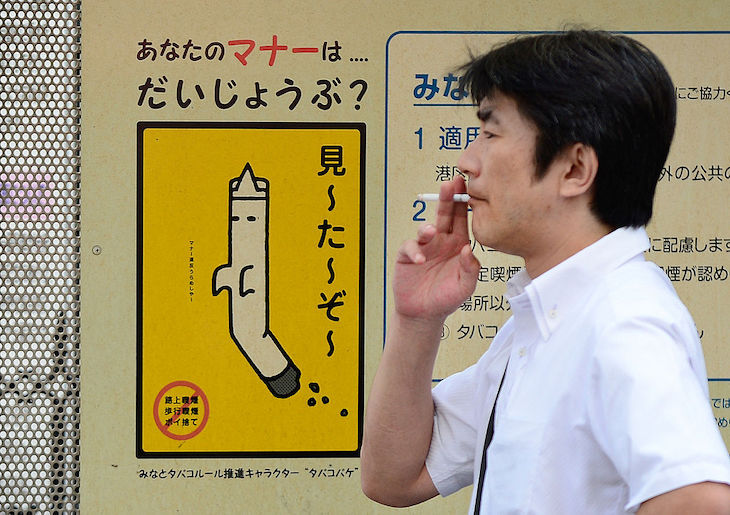The Japanese city of Osaka has banned smoking on the streets in an apparent effort to smarten up the city and make it more ‘visitor-friendly’ ahead of this year’s World Expo, which begins in April. Smoking had been prohibited in six zones, including around the central station prior to the announcement. But on Monday, all public streets, buildings, parks and plazas in the city became smoke free. Smoking and vaping in all but the smallest eateries has been banned too, though designated smoking rooms will still be permitted.
The fact that the smoking ban is getting significantly more coverage than the Expo itself highlights the difficulties organisers have had in rousing interest in the looming jamboree. It suggests the ban might just be a desperate attempt to grab a bit of global attention. The Expo has been a flop so far, with the public mood consistently negative. There are doubts about whether the site will be ready (one European nation was told their pavilion would be completed a month after opening day) and only half the target of tickets have been sold. The projected visitor count of 28 million looks insanely ambitious.
It probably isn’t the off chance of a cloud of cigarette smoke wafting into your face that is putting people off. The Osaka Expo never had much public support and has been plagued by bad publicity, largely related to the cost (it is currently running at 90 per cent over budget) since it was awarded back in 2018. Osakans don’t seem to want to pay for the blooming thing any more than the residents of cash-strapped Tokyo wanted the 2020 Olympics (which cost $20 billion (£16 billion) and was then held behind closed doors anyway due to Covid concerns). We Tokyoites are still paying off an event we only got to watch on TV.
Smoking and vaping in all but the smallest eateries has been banned too
There is also a general fatigue with these sorts of international spectacles. They made sense once when Japan was reintroducing itself to the world (the 1964 Olympics were seminal in that regard) and trying to kickstart its economy. But Japan is firmly ensconced in the family of nations now and the economy is up and running pretty well, thank you very much. The whole concept of an Expo has come in for particular scepticism in the globalised, internet age. It seems anachronistic. What exactly is going to be exposed in the Expo that couldn’t be experienced online?
There is increased cynicism about who benefits ultimately from these global boondoggles. Many see them as just excuses for officials to grandstand, and all sorts of ‘stakeholders’ (often former politicians who have moved on to lucrative company directorships) to cash in. Someone must have done well from the custom built and exorbitantly expensive arenas constructed for the 2002 World Cup. The Olympic stadium, which cost $1.4 billion (£1.1 billion), stands in central Tokyo like a huge piece of unloved public art and is similarly neglected. It has an Ozymandias quality.
A smoking ban is unlikely to turn the tide of public opinion in favour of another international jamboree. Outlawing public smoking is largely unnecessary anyway. There was time when was it was de rigeur for salarymen to light up at every opportunity. The joke ‘Why do so many Japanese smoke? Because if they didn’t, they’d live forever’ worked, but no more. The habit has been on the decline for years. The official smoking rate is 15 per cent, but if you factor in the world-class levels of citizenship displayed by the ultra polite Japanese, who smoke discretely, it simply doesn’t qualify as a public nuisance to be dealt with.
In any case, Osaka is already pretty friendly and welcoming, much more so arguably than pristine, rather sterile, and occasionally a little over pleased with itself Tokyo. Part of Osaka’s charm is that it is a looser, earthier, open-necked shirt version of the capital with a more distinctive, characterful vibe and, arguably, better food. Think Glasgow to Edinburgh, or Newcastle to London. It doesn’t suit a smoking ban.
The final giveaway that this no-smoking ordinance is not what it seems, is the size of the fine: 1000 yen (a fiver). Given that a pack of cigarettes in Japan is roughly the equivalent of £6, for a British visitor, assuming you finished the whole pack before being nabbed, you could pay up and still have saved money compared to prices back home (£18 or so). Few Japanese think there is more than a remote prospect of the police bothering to enforce the regulations.
It is not entirely clear the government will want them to anyway. The Japanese government does very nicely out of the cigarette tax and has a one-third stake in Japan Tobacco, the parent company of Japan Tobacco International (JTI), the world’s third largest cigarette company. The ban is a bit of a sham, then. Smoke and mirrors.








Comments